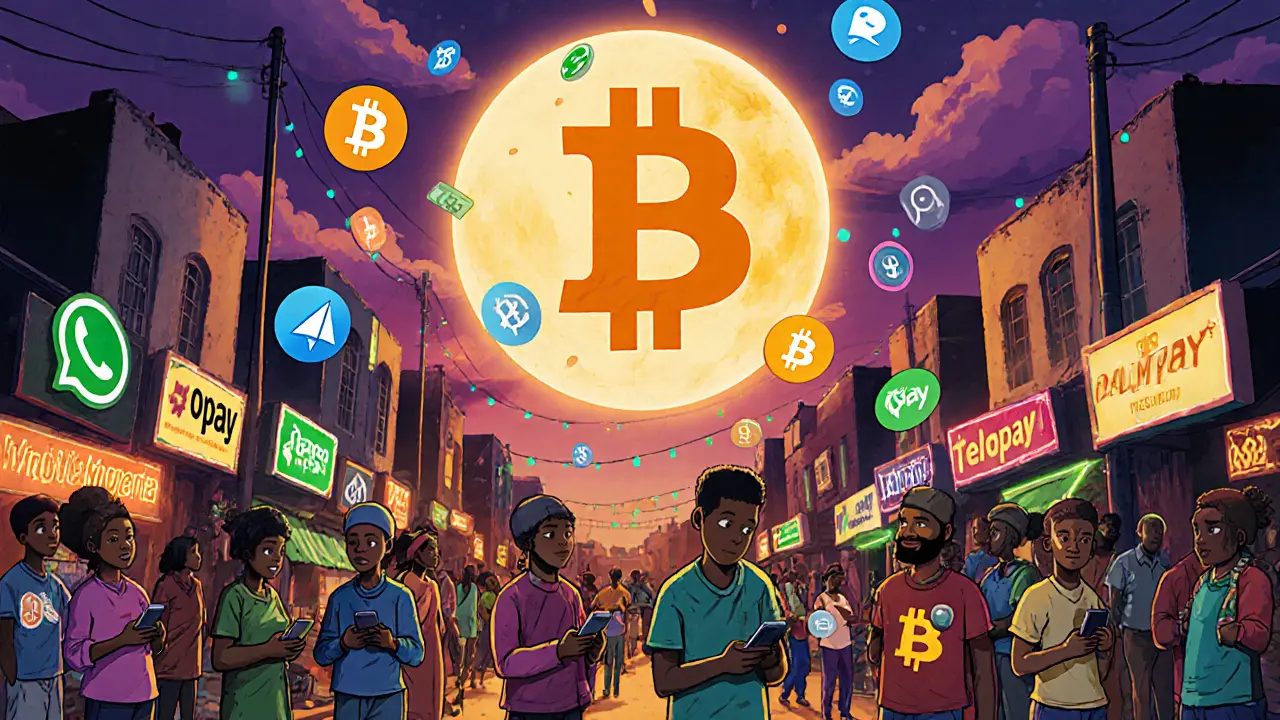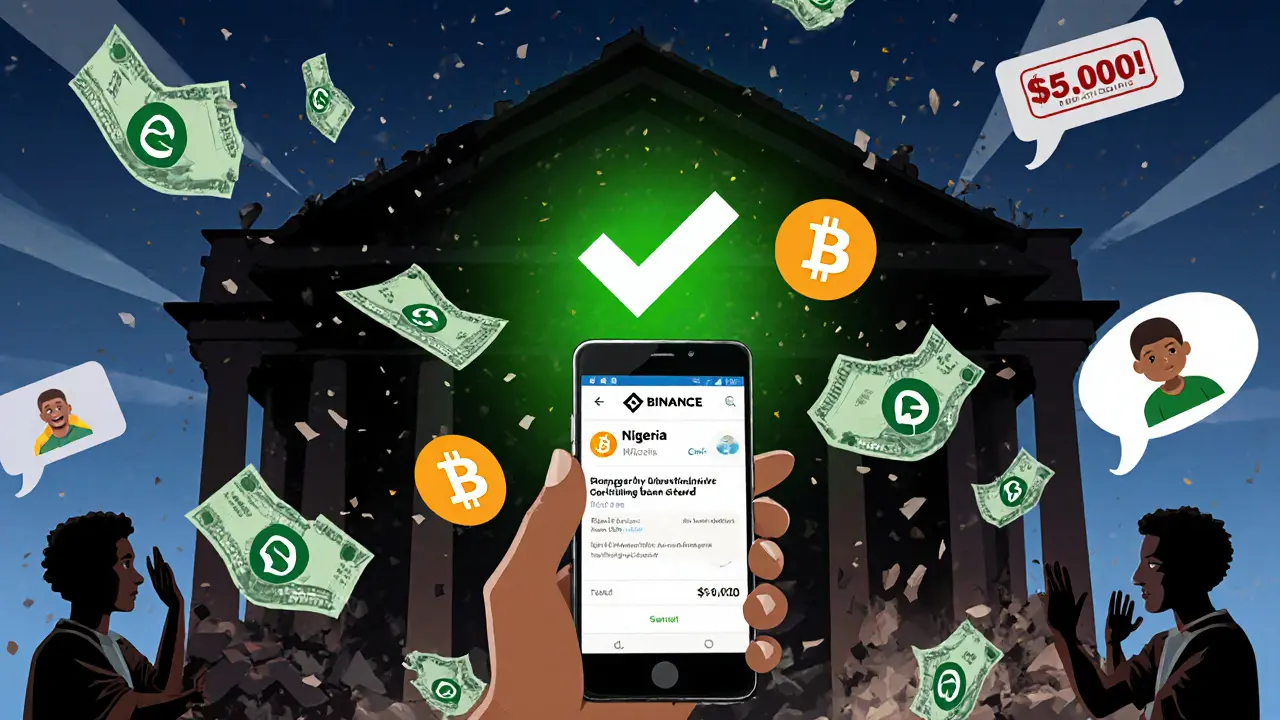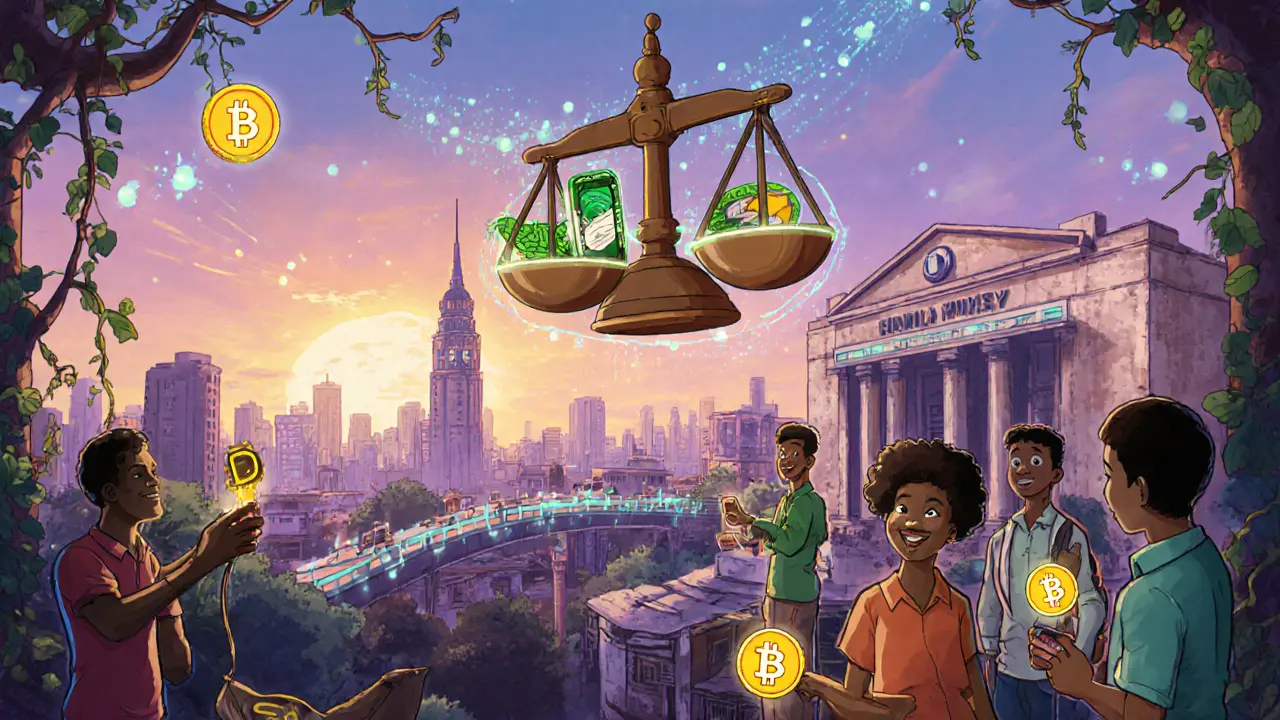 Oct, 1 2025
Oct, 1 2025
Nigeria P2P Crypto Trading Fee Calculator
How P2P Trading Works in Nigeria
Despite the bank ban, over $150 million in crypto trades happen monthly using WhatsApp, Telegram, and P2P platforms. This calculator shows how different payment methods impact your trading costs and speed.
Estimated Results
Net Amount Received: ₦0.00
Processing Time: 0 minutes
Scam Risk: Low
Fee Amount: ₦0.00
Estimated Crypto Value: 0.00
Cost Efficiency: 100%
Based on data from Nigerian P2P trading platforms (Binance P2P, Paxful, Bundle). Fees include transaction processing and potential exchange rate adjustments.
Nigeria’s crypto ban didn’t stop trading - it made it smarter
In February 2021, the Central Bank of Nigeria told banks to cut off anyone doing crypto business. No accounts. No transfers. No exceptions. At first, it looked like a win for regulators. But within months, something unexpected happened: crypto trading didn’t die. It went underground - and got better.
By 2022, Nigerians were moving over $150 million in crypto every month using just their phones and WhatsApp groups. Not through banks. Not through exchanges. Through people. Real people trading directly with each other. This wasn’t a glitch. It was a full-blown financial revolution, born out of necessity.
The ban was never about owning crypto - it was about banks
The CBN never said you couldn’t buy Bitcoin. They said banks couldn’t touch it. That tiny distinction made all the difference. While China crushed crypto ownership, Nigeria let individuals trade freely - as long as they didn’t use a bank account. That loophole became the foundation of a $56.7 billion crypto economy between July 2021 and June 2022, according to Chainalysis.
Nigerians didn’t need permission to trade. They just needed a way around the banks. And they found it - fast.
Binance P2P became the new ATM
Before the ban, most Nigerians bought crypto through regulated exchanges. After? They turned to Binance P2P. By late 2022, over 1.2 million Nigerians were using it. Why? Because it didn’t need a bank. You could buy Bitcoin with a bank transfer, mobile money, or even airtime credits - all peer-to-peer.
Traders posted ads: “Sell 0.05 BTC for ₦250,000.” Buyers would message them, agree on a price, send the naira, and get the crypto. No middleman. No approval. No waiting days for a wire. Just trust - and verification.
It wasn’t perfect. But it worked. And it scaled.

WhatsApp and Telegram were the real exchanges
Forget trading platforms. The real action happened in private groups. 78% of traders used WhatsApp to verify payments. 63% used Telegram to check live prices. These weren’t just chats - they were marketplaces.
One group might have 50,000 members. If someone got scammed, the group would post a warning. Names. Phone numbers. Bank details. The community became the regulator. Blacklists circulated faster than any government alert.
Some groups even created their own rating systems. Traders with 20+ successful trades got a green check. New users started with small test trades - ₦5,000 first - before risking bigger amounts. This simple habit cut scams by 37%, according to CryptoNaija’s community data.
The hidden cost: frozen accounts and lost money
For every success story, there was a nightmare.
42% of traders reported being scammed at least once. One Reddit user lost ₦380,000 when a seller vanished after he released Bitcoin. No bank. No chargeback. No recourse.
Even worse? Getting paid was risky. 67% of users who received crypto payments had their bank accounts frozen - not because they broke the law, but because the bank saw unusual activity. One trader told Techpoint Africa his account was locked for six months after receiving a ₦120,000 payment from a crypto sale. He had to go to the branch with screenshots, receipts, and a lawyer to get it back.
And then there were the delays. Bank transfers took 12 to 72 hours to clear. Some traders used mobile money services like Opay or Palmpay to speed things up. Others bought airtime and sold it for cash. It was messy. But it kept the economy running.
Who was trading? Students, small business owners, and hustlers
This wasn’t just rich investors. It was students paying tuition. Small shop owners buying inventory. Freelancers getting paid in dollars without a PayPal account.
68% of traders were under 35. Nearly half were students. Almost a third ran small businesses. One Reddit user, LagosTrader87, started with ₦5,000 in March 2021. By December 2022, he had ₦2.3 million - all from P2P trades. He used it to finish university.
YouTube channels like “Crypto With Tolu” grew to 247,000 subscribers teaching new users how to avoid scams. Telegram groups offered free arbitration. If two traders argued over a payment, a neutral third party would step in and mediate. Over 1,200 disputes were resolved each month by late 2022.

Nigeria became the world’s second-biggest crypto adopter
Despite the ban, Nigeria jumped from 28th to 2nd on Chainalysis’ 2022 Crypto Adoption Index. Only Vietnam ranked higher. And Nigeria had a fraction of the population.
Why? Because the ban forced innovation. People built tools no one expected. Local platforms like Quidax and Bundle emerged, integrating crypto with mobile money. Developers created multi-signature escrow apps that didn’t rely on banks. By 2022, Nigerian users made up 32% of Paxful’s global escrow volume.
Even the government noticed. A leaked CBN memo from February 2022 admitted the ban had created a “robust but unregulated crypto ecosystem” processing over $100 million monthly. They didn’t stop it. They just lost control.
The ban ended - but the underground didn’t disappear
On December 23, 2023, the CBN lifted the ban. Banks could now work with licensed exchanges. It looked like victory for regulators.
But the underground didn’t vanish. It adapted.
In February 2024, the SEC banned Binance P2P trading. Why? Because they still didn’t trust peer-to-peer. So traders moved to smaller platforms. Some switched to crypto-to-crypto swaps. Others used crypto wallets to receive payments directly.
And here’s the real shift: 89% of Nigerians now see crypto as a legitimate financial tool - even if the government doesn’t fully approve. The ban didn’t kill crypto. It made it part of the culture.
What’s next? Taxation, regulation, and the hybrid future
The Investments and Securities Act of March 2025 now classifies crypto as a financial security. That means it’s legal - but regulated. And starting in 2026, a 25% tax on crypto profits kicks in.
Will that push activity back underground? Probably. When taxes rise and bureaucracy grows, people find ways around them. Nigeria already proved that.
The real legacy of the ban isn’t the lifting of it. It’s what Nigerians built while no one was watching. A financial system that didn’t need banks. That didn’t need permission. That worked because people trusted each other - not institutions.
Other countries are watching. And learning.
Was crypto illegal in Nigeria during the ban?
No. The Central Bank of Nigeria banned financial institutions from handling crypto transactions - not individuals. People could still buy, sell, and hold crypto. The ban targeted banks, not users. That’s why trading continued through peer-to-peer platforms like Binance P2P.
How did Nigerians trade crypto without banks?
They used peer-to-peer (P2P) platforms like Binance P2P, Paxful, and local apps. Buyers and sellers connected directly, using WhatsApp and Telegram to coordinate. Payments were made via bank transfers, mobile money (Opay, Palmpay), or even airtime credits. Escrow systems held crypto until payment was confirmed.
Did the crypto ban reduce trading in Nigeria?
No - it increased it. Despite the ban, Nigeria ranked 2nd globally in crypto adoption in 2022. Monthly P2P trading volume hit $150 million by late 2022. The ban pushed trading underground, but demand was so high that people built entirely new systems to keep it going.
What were the biggest risks of trading crypto underground?
The biggest risks were scams and frozen bank accounts. 42% of traders reported being scammed at least once. 67% had their personal bank accounts frozen after receiving crypto payments. There was no official recourse. Trust was built through community blacklists, test trades, and reputation systems.
Why did Nigeria rank so high in crypto adoption despite the ban?
Nigeria’s youth-driven economy, high inflation, and weak banking access made crypto essential. With 68% of traders under 35 and nearly half being students, crypto became a way to save, earn, and pay for essentials. The ban didn’t stop adoption - it forced innovation. Nigerians created a decentralized, community-run financial network that outperformed traditional systems.
Is crypto still popular in Nigeria after the ban was lifted?
Yes - even more so. After the ban ended, 89% of Nigerians said they still view crypto as a legitimate financial tool. While banks can now work with licensed exchanges, many traders still prefer P2P for its speed and flexibility. The underground infrastructure didn’t disappear - it became part of the mainstream.
Leo Lanham
November 6, 2025 AT 11:57Brian Webb
November 7, 2025 AT 17:28Whitney Fleras
November 8, 2025 AT 21:10Colin Byrne
November 9, 2025 AT 18:24Alexis Rivera
November 11, 2025 AT 05:31John Doe
November 12, 2025 AT 04:36Anthony Allen
November 12, 2025 AT 14:01Robert Bailey
November 13, 2025 AT 14:26Wendy Pickard
November 13, 2025 AT 17:25Natalie Nanee
November 15, 2025 AT 16:43Angie McRoberts
November 17, 2025 AT 10:07Chris Hollis
November 18, 2025 AT 17:47Angie Martin-Schwarze
November 18, 2025 AT 22:04Janna Preston
November 20, 2025 AT 03:22Meagan Wristen
November 21, 2025 AT 02:33